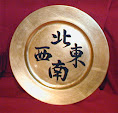Anyway, an interesting article I have stumbled upon is the Wikipedia article about the so-called Crisis of the Third Century: The Crisis resulted in such profound changes in the Empire's institutions, society, economic life and, eventually, religion, that it is increasingly seen by most historians as defining the transition between the historical periods of classical antiquity and late antiquity. I would add that it also prefigures the key changes between antiquity and the Middle Ages.
Seeing how the end of an empire brings about social changes that deeply impact the areas formerly managed by the declining empire, I have excerpted and commented a few key sentences from the Wikipedia article.
 |
| a new Malki manour |
In the years following the emperor's death, generals of the Roman army fought each other for control of the Empire and neglected their duties in preventing invasions from foreigners.
I believe the Middle Sea Empire likewise becomes the scene of many localised, small-scale wars to control the various now-independent (and isolated, because of the Closing) parts of the former Middle Sea Empire. This being a fantasy setting, though, these small-scale wars are as likely to involve powerful wizards as military commanders.
Dozens of formerly thriving cities, especially in the Western Empire, had been ruined, their populations dispersed and, with the breakdown of the economic system, could not be rebuilt. Major cities and towns, even Rome itself, had not needed fortifications for many centuries; many now surrounded themselves with thick walls.
This is in my opinion one of the most mediaeval-ish parts. The God Learner cities of the Umathelan coast, who used to be large, open, and without walls, are now partly destroyed, and their remnants of population have regrouped in the most easily defendable quarter of the city (possibly the one on a hill), and are busy building up defensive walls.
Internally, the empire faced hyperinflation caused by years of coinage devaluation. This had started earlier under the Severan emperors who enlarged the army by one quarter and doubled the legionaries' base pay. As each of the short-lived emperors took power they needed ways to raise money quickly to pay the military's "accession bonus" and the easiest way to do so was by simply cutting the silver in coins and adding less valuable metals like bronze or copper.
No-one trusts Umathelan coinage any longer... The metal therein is too debased. This is a further incentive for "dungeon delving" by the way: delvers hope to find caches of non-debased metal in the abandoned dungeons of the God Learners.
One of the most profound and lasting effects of the Crisis of the Third Century was the disruption of Rome's extensive internal trade network. Ever since the Pax Romana, starting with Augustus, the empire's economy depended in large part on trade between Mediterranean ports and across the extensive road systems to the Empire's interior. Merchants could travel from one end of the Empire to the other in relative safety within a few weeks, moving agricultural goods produced in the provinces to the cities, and manufactured goods produced by the great cities of the East to the more rural provinces.
[...]
With the onset of the Crisis of the Third Century, however, this vast internal trade network broke down. The widespread civil unrest made it no longer safe for merchants to travel as they once had, and the financial crisis that struck made exchange very difficult with the debased currency. This produced profound changes that, in many ways, would foreshadow the very decentralised economic character of the coming Middle Ages.
Roads aren't safe any longer — where they still exist, since no-one is able to maintain them any longer. Banditry is rife. Whatever trade caravans are left must hire various mercenaries and swords-for-hire to accompany them, and to protect them. This provides further adventure seeds in post-imperial Umathela.
Large landowners, no longer able to successfully export their crops over long distances, began producing food for subsistence and local barter. Rather than import manufactured goods from the empire's great urban areas, they began to manufacture many goods locally, often on their own estates, thus beginning the self-sufficient "house economy" that would become commonplace in later centuries, reaching its final form in the Middle Ages' manorialism. The common free people of the Roman cities, meanwhile, began to move out into the countryside in search of food and better protection.
Made desperate by economic necessity, many of these former city dwellers, as well as many small farmers, were forced to give up hard-earned basic civil rights in order to receive protection from large land-holders. In doing so, they became a half-free class of Roman citizen known as coloni. They were tied to the land, and in later Imperial law their status was made hereditary. This provided an early model for serfdom, the origins of mediaeval feudal society and of the mediaeval peasantry.
Oh yes, former proud citizens of the Middle Sea Empire. If you haven't been strong or scheming enough to live through the upheavals of your cities, you must have fled to the countryside and started up eking out a living toiling the earth. Glorantha being Glorantha, country-dwelling Malki labourers must somehow have included worship to Ernamola in their once-monotheistic cults. They also need a protector in case of war, strife, or invasions. Hence the Malki manours that are appearing in the Umathelan countryside (whereas the Malki used to be concentrated on the coast before the Closing).












No comments:
Post a Comment